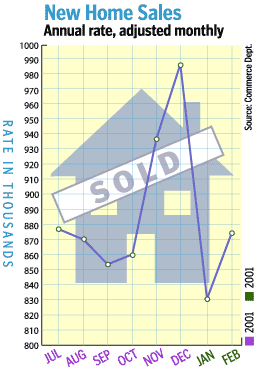
NEW YORK (CNN/Money) -
The pace of new home sales in the United States rose in February, the government said Wednesday, showing continuing strength in the housing market, though the rate was slower than most analysts expected.
The Commerce Department said new home sales rose 5.3 percent in February to an annual rate of 875,000 units after plunging a revised 15.8 percent to an 831,000-unit pace in January. Economists surveyed by Briefing.com expected a pace of 890,000 units.
The pace of new home sales is down 8.8 percent from February 2001, when it was 959,000 units. It's down 11.3 percent from December's red-hot rate of 987,000 units, a pace driven by unseasonably warm weather.
"It was a relatively small increase, but we had a huge bulge in sales in December, and existing home sales were very strong," said Robert Van Order, chief international economist at government-sponsored mortgage lender Freddie Mac (FRE: up $0.10 to $63.42, Research, Estimates). "The latest Mortgage Bankers Association of America survey shows applications are still rising. What's going on can only be described as quite a strong market."

The Commerce Department said the median price of new homes sold in February was $179,600, down from January's median price of $184,100, but still higher than the median price in any month during 2001.
U.S. stock prices were higher in midday trading, while Treasury bond prices posted small gains.
Wednesday's data were relatively tepid compared with recent data on new home construction and existing home sales. But new home sales comprise only about 15 percent of the U.S. housing market. The bulk of the market is in existing home sales, which have cooled off only slightly after setting a one-month record pace in January and a record year of sales in 2001.
"New home sales are notoriously fickle and can lead to big revisions, said Orawin Velz, economist at mortgage broker Fannie Mae (FNM: Research, Estimates). "To read too much from this data is premature."
The relentless strength of the housing market has led some observers to wonder if the nation is in the midst of a speculative bubble that could pop, sending home prices plummeting. Most economists dismiss this view, saying renewed strength in the U.S. economy will support demand, and the supply of homes is ample enough to meet demand and keep prices reasonable, while still being low enough to prevent a glut of unsold homes.
"We don't see a bubble because the strength didn't come from speculative demand," Velz said. "It came from low 30-year mortgage rates, good demographics and other good fundamental factors that boosted demand. Even if demand declines, we won't see home sales falling off a cliff."
The housing market is especially crucial to the economy because home equity is such an important part of consumers' balance sheets. A hot housing market has helped boost consumer confidence and ease the pain of falling stock prices. And consumers with new homes tend to spend money on them, boosting sales of everything from furnishings to cleaning supplies.
Consumer spending made up $6 trillion of the $9 trillion U.S. economy last year and helped make the recession that likely began in March 2001 one of the shortest and mildest in history.
To keep consumers spending, the Federal Reserve cut its target for short-term interest rates 11 times in 2001, a record for a calendar year. Fed cuts don't have an immediate impact on mortgage rates, but eventually the easier cost of borrowing spread throughout the economy.
| |
 Related links
Related links
| |
| | |
| | |
|
At its first two policy meetings in 2002, the Fed decided to leave rates alone, and it shifted to a neutral stance at its latest meeting, saying the risks to the economy were balanced between a risk of inflation and a risk of economic weakness.
Most observers believe the Fed will begin raising short-term interest rates again some time this year, and mortgage rates also are likely to rise, which will certainly temper the housing market's strength.
"We just had five awfully good years for housing," Freddie Mac's Van Order said. "That's got to fall off. We see a little increase in mortgage rates, but they're still pretty low. Nobody's talking about anything like a crash."

|

